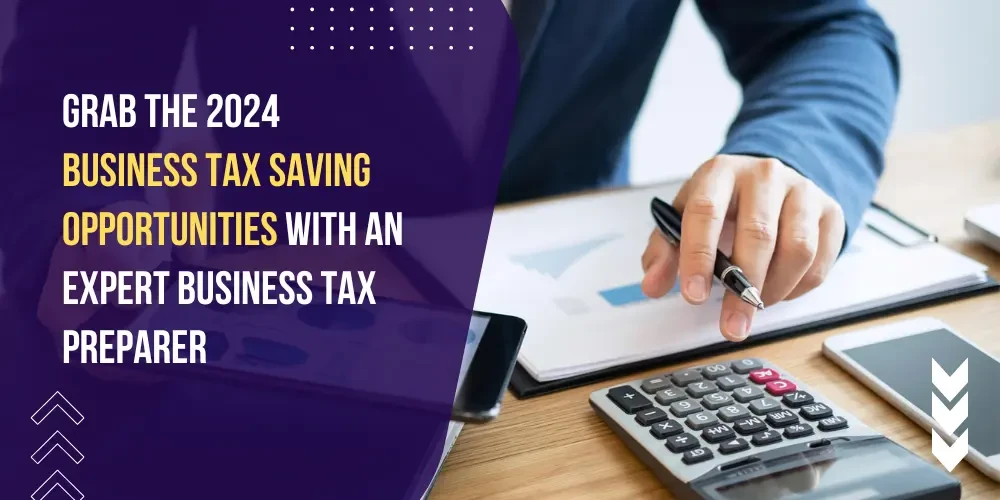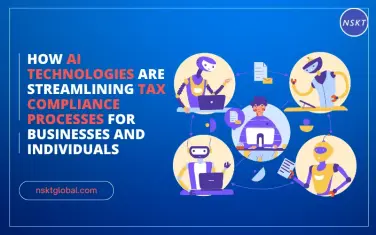Table of Contents
As business owners prepare to navigate the complex tax landscape of 2024, strategic business tax planning and preparation can be a crucial process to manage evolving tax regulations and identify new opportunities for savings. Businesses that prioritize tax planning with an expert business tax preparer can significantly boost financial health and gain a competitive edge. These professionals bring in-depth knowledge of the latest tax laws, maximize deductions and credits, and identify industry-specific opportunities often overlooked by general practitioners, potentially leading to substantial savings. Here are four ways you can grab the business tax-saving opportunities with these professionals in 2024:
#1. Optimizing Business Structure for Tax Efficiency
One of the most impactful ways an expert business tax preparer can help you save on taxes is by ensuring your business structure is optimized for tax efficiency. A business tax CPA will conduct a comprehensive analysis of your business's financial situation, growth projections, and long-term goals to determine if your current structure is the most tax-efficient option. Based on this analysis, they might recommend restructuring your business to take advantage of more favorable tax treatments.
For instance, switching from a sole proprietorship to an S corporation could potentially reduce your self-employment tax burden. For instance, as a sole proprietor, you pay self-employment tax (15.3% as of 2024) on all your business profits. However, as an S corporation owner, you can pay yourself a reasonable salary (subject to employment taxes) and take the rest of the profits as distributions, which aren't subject to self-employment tax. This strategy alone could save you thousands in taxes annually. By optimizing your business structure, you're not just saving on taxes for the current year, but potentially setting your business up for long-term tax efficiency.
#2. Maximizing Deductions and Credits
Leveraging accurate tax deductions and credits are powerful tools for reducing your business's tax liability. However, many business owners aren't aware of all the opportunities available to them. Opting for business tax services can help you stay up-to-date with the latest tax laws and help you identify deductions and credits that you might have overlooked. Here are some areas where a tax expert can help you maximize your deductions:
Business Expenses: Your tax preparer can help you identify all legitimate business expenses, including some you might not have considered. For example:
- Home office deductions
- Vehicle expenses for business use
- Travel, meals, and entertainment expenses
- Professional development and education costs
- Subscription and membership fees
Depreciation: A tax expert can help you navigate complex depreciation rules to maximize your deductions. They might suggest strategies like:
- Using Section 179 expensing to deduct the full cost of qualifying equipment in the year of purchase
- Applying bonus depreciation rules to eligible assets
- Conducting a cost segregation study for commercial real estate to accelerate depreciation deductions
Employee Benefits: If you offer benefits to your employees, your business tax preparer can help you understand the tax implications and maximize related deductions. This might include:
- Health insurance premiums
- Retirement plan contributions
- Education assistance programs
- Dependent care assistance
Charitable Contributions: If your business makes charitable donations, a tax expert can help you properly document and claim these deductions.
For Credits:
In terms of tax credits, which provide a dollar-for-dollar reduction in your tax bill, your business tax preparation expert can help you identify and claim credits such as:
- Research and Development (R&D) Tax Credit: Up to 20% of qualified research expenses. Small businesses may apply up to $250,000 against payroll taxes.
- Work Opportunity Tax Credit (WOTC): $1,200 to $9,600 per eligible employee from certain target groups.
- Small Business Health Care Tax Credit: Up to 50% of employer-paid premiums for businesses with fewer than 25 employees.
- Renewable Energy Investment Tax Credits: 30% credit for solar, wind, and geothermal investments.
- Electric Vehicle Tax Credit: Up to $7,500 for new electric vehicles and upto $40,000 for commercial clean vehicles over 14,000 pounds.
- Disabled Access Credit: 50% of eligible expenses, up to $5,000, for improving accessibility.
- Childcare Facilities and Services Credit: Up to 25% of qualified expenditures, limited to $150,000 annually.
- New Markets Tax Credit: 39% of investments in low-income communities, claimed over seven years.
- Retirement Plan Startup Costs Credit: Up to $5,000 annually for three years for new plan setup.
- Family and Medical Leave Credit: 12.5% to 25% of wages paid during qualifying leave.
#3. Strategic Timing of Income and Expenses
The timing of your business's income and expenses can significantly impact your tax liability. An expert business tax preparer can help you implement strategies to manage your taxable income effectively. This might involve accelerating expenses into the current tax year or deferring income to the next year, depending on your business's financial situation and tax bracket. Here's how a tax expert might help you strategically time your income and expenses:
Income Deferral: If you expect to be in a lower tax bracket in 2024, your tax preparer might advise you to defer some income to that year. Strategies could include:
- Delaying billing for services performed late in the year
- For cash-basis businesses, waiting until January to send invoices for December work
- Postponing asset sales that would result in capital gains
Income Acceleration: Conversely, if you anticipate being in a higher tax bracket next year, your preparer might suggest accelerating income into the current year. This could involve:
- Offering discounts to customers who pay early
- Collecting outstanding receivables before year-end
- For accrual-basis taxpayers, providing services and billing for them before the year ends
Expense Acceleration: If you've had a particularly profitable year, your tax preparer might suggest increasing your deductible expenses before year-end. This could include:
- Making large equipment purchases to take advantage of Section 179 expensing
- Prepaying some expenses for the coming year, such as insurance premiums or rent
- Stocking up on supplies that will be used in the near future
Expense Deferral: In lower-income years, it might be beneficial to push some expenses into the next tax year. Your preparer might advise:
- Delaying major purchases until the new year
- Waiting to pay bonuses until January
- Holding off on making repairs or improvements until the next tax year
Your tax preparer can also help you understand the cash flow implications of these strategies. For instance, while prepaying expenses might reduce your current year's tax bill, it's important to ensure you have sufficient cash reserves to cover ongoing operational costs.
Moreover, business tax services can help you navigate complex rules surrounding income and expense recognition. It can ensure you are correctly applying the economic performance rule for accrual-basis taxpayers, which dictates when certain expenses can be deducted. By carefully timing your income and expenses, you can potentially reduce your overall tax burden across multiple tax years, leading to significant long-term savings.
# 4. Retirement Planning for Tax Benefits
Retirement planning isn't just about securing your future, it is also a powerful tax-saving tool for business owners. An expert business tax preparer can help you navigate the various retirement plan options available to you and your employees, such as SEP IRAs, SIMPLE IRAs, or 401(k) plans. Here's how a tax expert can help you leverage retirement planning for tax benefits:
Choosing the Right Plan: Your tax preparer can help you understand the pros and cons of different retirement plans from a tax perspective. For example:
- SEP IRA: This plan allows for high contribution limits (up to 25% of compensation or $69,000 in 2024, whichever is less) and is relatively easy to set up and administer.
- SIMPLE IRA: This plan is ideal for small businesses with 100 or fewer employees. For 2024, the contribution limit is $16,000, with an additional $3,500 catch-up contribution allowed for those 50 and older. Employers must either match employee contributions dollar-for-dollar up to 3% of compensation or make a 2% nonelective contribution for all eligible employees.
- 401(k): This plan offers the highest contribution limits and the most flexibility, but comes with more complex administration requirements. For 2024, employees can contribute up to $23,000, with an additional $7,500 catch-up contribution for those 50 and older. The total contribution limit (employee + employer contributions) is $69,000 or 100% of the employee's compensation, whichever is less.
Related read: Everything you must know about IRAs
Leveraging Retirement Plans for Employee Benefits: If you have employees, offering a retirement plan can be a powerful tool for attracting and retaining talent. Your tax preparer can help you understand:
- The tax credits available for setting up a new retirement plan (up to $5,000 per year for the first three years as of 2024)
- How to structure employer matching or profit-sharing contributions to maximize tax benefits
- The potential payroll tax savings from employee contributions to these plans
Compliance and Reporting: Retirement plans come with various compliance requirements. Small business tax services can help ensure you are meeting all necessary obligations, such as:
- Filing required forms with the IRS (like Form 5500 for certain plans)
- Providing required notices to employees
- Conducting non-discrimination testing for 401(k) plans
By setting up and contributing to these plans, you can reduce your taxable income while also providing valuable benefits to your employees. Your tax preparer can help you understand the tax implications of different contribution levels and advise on the most tax-efficient way to fund these plans.
#5 Leverage Tax Benefits through Health Savings Accounts (HSAs)
Health Savings Accounts (HSAs) offer a beneficial way for business owners to manage healthcare costs while reaping significant tax benefits. An expert business tax preparer can help you navigate the complexities of HSAs and maximize their tax-saving potential. Here's how HSAs can benefit your business:
- Reduced Taxable Income: Contributions to HSAs are made with pre-tax dollars, effectively lowering your taxable income. For self-employed individuals, there's often the added advantage of deducting health insurance premiums for themselves, their spouses, and children up to age 27.
- Triple Tax Advantage: HSAs offer a unique triple tax benefit. Contributions are tax-deductible, earnings grow tax-free, and withdrawals for qualified medical expenses are tax-free.
- Flexibility and Growth: Unlike some healthcare spending accounts, HSA funds roll over from year to year and do not expire. This allows you to build a healthcare nest egg over time, potentially growing your savings through investment options offered by many HSA providers.
- Contribution Limits: In 2023, the contribution limits were $3,850 for individual coverage and $7,750 for family coverage under a high-deductible health plan.
A knowledgeable tax preparer can ensure you're eligible for an HSA based on your health insurance plan, help you understand what qualifies as a medical expense for tax-free withdrawals, and integrate HSA planning into your overall tax strategy.
#6 Maximize Tax Savings by Onboarding Family Members
Employing family members can be a savvy tax strategy for small businesses when implemented correctly. An expert business tax preparer can help you navigate the complexities of family employment to maximize tax benefits while ensuring compliance with IRS regulations. Here's how hiring family members can be a tax-efficient move:
Children's Employment: Hiring your children offers notable tax advantages. Income paid to your children is often subject to a lower marginal tax rate, and in some cases, the tax liability may be eliminated. For sole proprietorships, partnerships where both partners are parents of the child, and single-member LLCs, wages paid to a child under 18 are not subject to Social Security and Medicare taxes.
Spousal Employment: Hiring a spouse can also yield tax benefits. Their wages are not subject to Federal Unemployment Tax Act (FUTA), providing additional savings for the business. Employing your spouse may also allow you to establish a medical reimbursement plan, potentially making all family health care costs deductible.
Retirement Planning: Family employment can open up additional retirement savings opportunities. Children with earned income become eligible to contribute to Roth IRAs, potentially jump-starting their retirement savings with tax-free growth.
Business Justification: It's crucial to ensure that the earnings paid to family members are justifiable for legitimate business purposes. The IRS requires a bona fide business reason for their employment. Your tax preparer can help you document job descriptions, work performed, and compensation to substantiate the business necessity of family employment.
Choosing the Right Business Tax Preparer
A skilled tax preparer helps you stay compliant, saving you money on potential penalties and interest. Moreover, good compliance practices often reveal additional tax-saving opportunities by providing a clearer picture of your business's financial situation. Consider these four essential factors when selecting a tax preparer:
- Credentials and Expertise: Look for recognized qualifications such as CPA, EA, or tax attorney status. Choose a preparer with relevant experience in your industry who stays current with evolving tax laws.
- Technological Proficiency: Ensure they use up-to-date tax software and are comfortable with cloud-based accounting systems. A tech-savvy preparer can help streamline your tax processes and leverage digital tools for better financial management.
- Communication Skills: Assess their ability to clearly articulate tax strategies and provide timely updates. A good communicator will keep you informed about your tax situation and potential issues.
- Proactive Approach: The best preparers offer year-round tax planning services and keep you informed about relevant tax law changes. They should anticipate tax implications of business decisions and suggest optimization strategies.
To Sum Up
Partnering with an expert business tax preparer can unlock significant tax-saving opportunities for your business in 2024. From optimizing your business structure to maximizing deductions and credits, strategically timing income and expenses, leveraging retirement planning for tax benefits, and ensuring compliance, these professionals bring valuable expertise that can substantially reduce your tax burden. As you navigate the complexities of business taxation, consider enlisting the help of an expert business tax preparer such as NSKT to ensure you are making the most of every available opportunity to optimize your business tax position. If you are a small business owner, the investment in professional small business tax preparation services often pays for itself many times over in tax savings and peace of mind, so don’t miss out on this opportunity!
Connect with our team of expert business tax preparers today for a free initial consultation and discover how we can help you save taxes in 2024.





